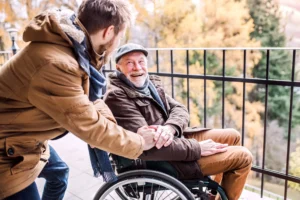Thank you for reading our blog. Things change quickly in assisted living, so please don't take this as the last word. Call us to make sure you are getting the current and best information at the best prices. Our service is provided at no cost to you. You don't need to figure it out alone. Call us at 310-853-8282.
Parkinson’s Overview
Parkinson’s disease is a neurodegenerative disorder of the central nervous system affecting movement. The initial presentation is often tremors, specifically in one hand. In the brains of Parkinson’s patients, nerve cell damage causes dopamine levels to drop. Dopamine is the neurotransmitter chemical that helps transfer messages from our brains to our muscles. For example, I first think about moving my arm, and a signal is sent using dopamine to the many nerves controlling movement in my arm, causing it to move. As Parkinson’s advances, both dopamine production and nerve cells become damaged and unable to transmit signals to the nervous system and then on to muscles.
Parkinson’s is a progressive disease. Medications can substitute dopamine for some patients for a time and slow down the progression of the symptoms, but the underlying disease process does progress. Later in the disease, slow movement (shuffling), increasing tremors, stiffness, loss of balance, loss of ability to speak, lack of control of major and minor muscle groups, and dementia can all occur.
Stages of Parkinson’s
Parkinson’s is generally thought to have five stages.
Stage One
During this initial stage, the person has mild symptoms and can generally continue with their life. Tremor and other movement difficulties occur on one side of the body only. Some changes in posture and in gait occur during this period. Facial expressions become less pronounced, indicating the beginning of the loss of nerve control. This facial change is sometimes referred to as a ‘flat’ effect, one which appears to be without response or emotion.
Stage Two
Symptoms start getting worse in this stage. Tremors, rigidity, and other movement problems spread to the other half of the body, and walking problems become more pronounced. People no longer trust their ability to control movement of the major muscle groups involved in walking, and the shuffling typical of Parkinson’s begins. People can still live alone or with family, but the Activities of Daily Living (ADLs) progress from ‘doable with more time’ to ‘difficult to accomplish on one’s own’. Physical therapy is often helpful in this stage.
Stage Three
This is the middle of the disease process. Loss of balance becomes more severe and movement slows even further. Falls increase, and speech becomes softer. ADLs become difficult to accomplish without help. It is during this period that homecare services and/or significantly increased family support is necessary.
Stage Four
At this point, Parkinson’s is severe and overwhelming. Movement requires a walker. The person with Parkinson’s needs help with virtually all ADLs and is unable to live alone.
Stage Five
This is the last stage of Parkinson’s. Stiffness and lack of motor control make standing and walking difficult to impossible. The person is often bedridden and cannot complete any Activities of Daily Living independently. The person may experience delusions, hallucinations, and Dementia. Some Parkinson’s patients develop a specific type of dementia called Lewy Body Dementia. Lewy Body creates a more unpredictable set of cognitive challenges than dementia related to Alzheimer’s disease, the most common cause of dementia. People in Stage Five require round the clock care.
How Can Assisted Living Help?
Most people consider assisted living when a person with Parkinson’s reaches Stage 3 and needs almost constant ADL support. During this stage, an individual can usually live in a larger assisted living community. Depending on the level of cognitive capability, a family may choose a memory care community where activities and care are geared toward people with diminished mental capacity.
People in the middle of the Parkinson’s disease process typically have several years of life remaining. They value social connections, even if they cannot easily express the satisfaction they get from interaction. They do everything very slowly and require lots of hands-on attention and care to accomplish even basic ADLs.
Homecare can be an option for people in this stage of the disease, as can 24-hour care and companionship delivered by a family member. Homecare can be quite expensive, though; some families cannot care for Parkinson’s patients at home. In other families, care may be provided by family members, but at some point, family members, often elderly, may not be able to physically accomplish the care. For these and other situations, Assisted Living might be a good option. Care can be provided for all ADL’s, and mild to moderate cognitive difficulties can be managed with compassion and specialized training.
What About the Last Stages of Parkinson’s?
Assisted Living communities can provide a positive 2-5-year home for people with advancing Parkinson’s disease. Families can visit frequently, knowing that their loved one is safe and is having all their needs taken care of. In fact, many family members and residents of Assisted Living report that they enjoy interactions more than they did when living at home – Professional staff now manage the time consuming and increasingly challenging aspects of care for the person with Parkinson’s, and the family can focus on being a family.
Assisted Living communities in Los Angeles, though, are not typically set up for a person in the last stages of Parkinson’s. When the person with Parkinson’s reaches this stage, they are more appropriate for a board and care home. In California, board and care homes also are licensed assisted living facilities, but they are licensed for a maximum of six people in a residential home setting. The board and care homes that Assisted Living Locators works with have a minimum of two caregivers for six people and provide a very high level of physical, round-the-clock care. Board and care homes also cater to individuals with dementia. In the later stages of dementia, a senior usually does better in a small home environment where activities can be tailored to individual needs and the physical space is easier to navigate.
Regardless of the stage, families should investigate their options well in advance and be ready for the progression in care that will be required. Assisted Living Locators Los Angeles is an expert in elder care planning and can be relied upon to help with this process.
Assisted Living Locators Los Angeles owner Sarah Ordover is one of LA’s top senior living advisors. Certified in dementia care, Sarah is a trained aging specialist who holds an RCFE assisted living administrator’s license. Sarah thoughtfully guides families through the senior living decision-making process, helping them find the best solution for their loved ones. Call Sarah at 310-853-8282 for a consultation. Assisted Living Locators is no-cost to clients.




